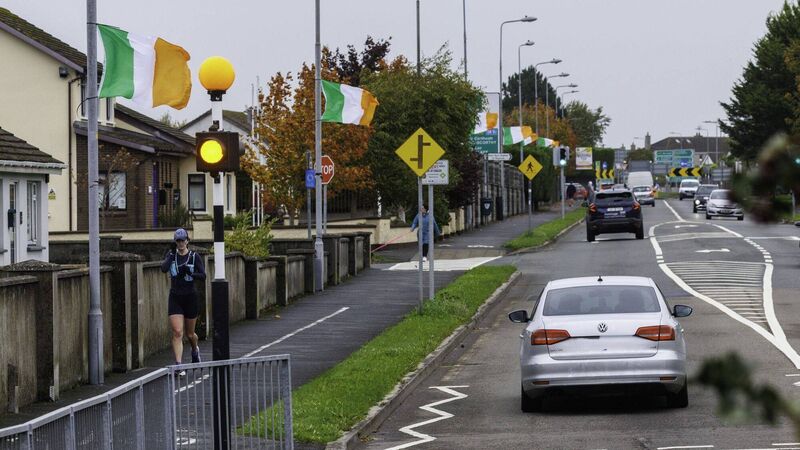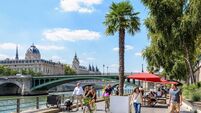Fergus Finlay: I was always proud of the Irish flag — now it is just a symbol of hostility

Tricolours along the O'Brien Road in Carlow, from the Éire Óg roundabout to the Hacketstown roundabout. No-one has claimed responsibility for putting them up so it is not known why they were erected in the first place. Picture: Michael O'Rourke Photography
We drove over to my daughter’s house at the weekend, all excited because we were going to see two of our grandkids and two more were going to join us. She lives, let’s say, in the south inner city in Dublin, and by the time we got there I was completely down in the dumps, and actually angry.
Getting to her street involved several junctions, all governed by traffic lights. At every junction you could see Irish flags, big ones, hanging from poles. They’d been tied to the poles at what I’d call ladder height, and whatever way they had been tied there was no possibility of them fluttering or waving. They just hung there, bedraggled and miserable. Roughly ten per junction, and then one on every lamppost along the streets we were travelling. We must have passed 70 or 80 of them in a relatively small area.
One had fallen off its pole and was lying half on the pavement, half in the gutter, filthy and there to be walked on. I wanted to stop the car and gather it up — no Irish flag should ever be left in a condition like that. But to my shame I didn’t, and it has bothered me ever since.
What bothers me even more though is all the questions. Who put them up? It involved considerable effort and expense? How was it done? Because it looked like the work of teams of people equipped with truck and ladders. We can all see it wasn’t and isn’t just in one location. There are thousands of them now, all over Ireland.
But the big question, that none of us seem to want to ask, is why? Why has this movement, symbolised by so many thousands of Irish flags, suddenly developed?
I’m Irish, the holder of an Irish passport since the day I turned 18. Apart from few enough holidays abroad (mainly because nowhere can beat West Cork), the odd usually day-long business trip, and one three-month study tour in Seattle, I’ve lived my entire life in Ireland. I love Ireland and I’m proud of being Irish. Proud of the atmosphere in our country, proud of the love of sport and reading and music and drama, proud of our cities and towns, proud of our politics with all its failings, proud of our endless desire for a bit of craic, proud of the welcome.
Because that’s what we are. We love it when someone calls to the house, we love stopping for a chat in the street. For generations we have marketed ourselves abroad as a country of welcomes. The main reason that was a successful campaign was because it was based on the truth — all successful brands, if they want to sustain themselves, have to be based on true origins.
Their message is not one of pride in our country. They say others aren’t welcome here. Especially others with black or brown skin or foreign languages or different religions.
All my life I’ve been proud of my flag. Now I’m ashamed of those limp symbols of hostility hanging off lampposts. I never thought I’d live to see the day when the flag of my country could be seen as a token of racism or intolerance.
Behind the flags there is more than racism. We’ve already seen several outbursts of dangerous and deeply sinister violence aimed at people seeking refugee status in Ireland, and there is growing evidence of the emergence of an underground version of far-right politics here. It may be fuelled by money from overseas, but wherever it’s coming from there is definitely money, and a fair bit of it.
We need to debate this — all of it, and we need to do it honestly. I totally disagreed with the timing of Simon Harris’s intervention a few days ago, when he seemed (to me at any rate) to say the core problem was too many immigrants. Those remarks were seized on by the purveyors of hate as a vindication of their position, and that should never have been allowed to happen.
But if we need to have a debate, let’s have a debate. There was a time in Ireland when debate on critical issues of public importance was led by government. In the old days, something called a Green Paper would be published. It would set out facts and figures and ideas for discussion. After a period of consultation that would be turned into a White Paper with concrete proposals for action and legislative change if necessary.
It's absolutely vital now that we have a debate with facts and not with myths. There are facts on the Government’s own website, of course, but because of the really dull way they’re presented they seem to carry no weight whatever. They do show about one in seven of us was not born in Ireland. Of that one in seven, about a third — which is to say one in every 20 of us — is from outside the EU and Britain. It’s that one in 20 we seem to regard as a threat.
Even though most of our hotels would have to close if we sent them home, as well as a lot of our restaurants. Even though the waiting lists in our health services would get longer and longer if we sent them home. Even though every nursing home in Ireland would face a crisis if the people with black or brown skins were all expelled.
We have rough data on how many immigrants there are. We have no data on how many we need, and how many we can cope with. We know in our heart of hearts that immigrants aren’t the cause when it comes to housing crises or public service shortages, but it has just become too easy to blame “others”. When we find ourselves so easily allocating blame and sticking flags on poles to say others aren’t welcome, is it any wonder some will try to burn them out?
So let’s get the debate out from behind the tattered flags erected in darkness. A Green Paper, a period of consultation conducted in the open, and a White Paper setting out our settled policy is what’s needed now — and, if the truth were told, has been needed for some time. The Green Paper should come from the Taoiseach, and the Taoiseach should lead the debate.
Immigration in Ireland has always in the past been hived off to the Department of Justice, seen as a security issue. But it’s much more than that. It’s about economics and social policy, for sure. But it’s also about our character, our identity, our role and place in the world around us. That’s why we need a much more rounded discussion, and not just a set of administrative responses. There’s a lot we need to recapture — maybe including above all our national flag. We can’t afford to leave it to the darkness.






